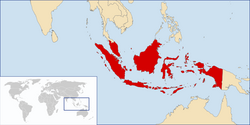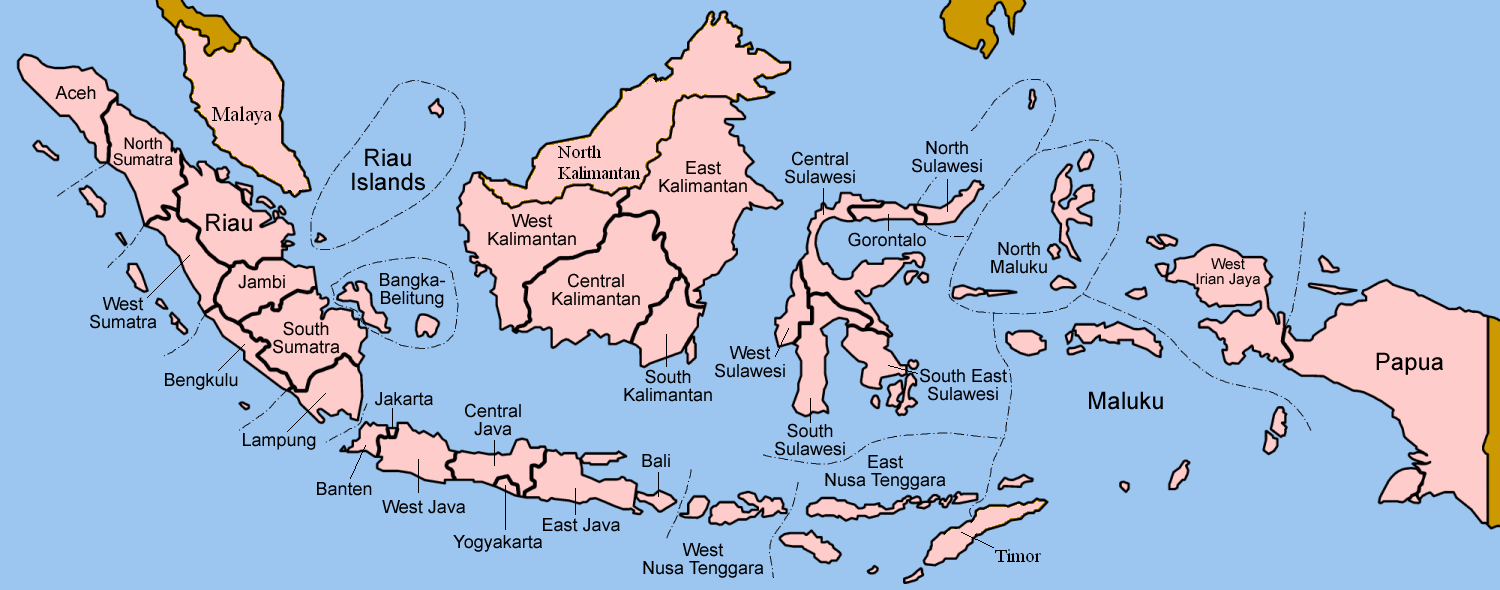Indonesia
From Worldatplay
| Republik Rakyat Indonesia People's Republic of Indonesia | |
| | |
 | 
|
| Flag | Coat of arms |
| | |
| Motto "Para Pekerja di Seluruh Dunia, Bersatulah!" (Indonesian) "Workers of the World, Unite!" | |
| | |
| Anthem Internasionale | |
| | |

| |
| | |
| Capital (and largest city) | Jakarta 6°10.5′S, 106°49.7′E |
| | |
| Official languages | Indonesian |
| | |
| Independence - Declared - Recognized | August 17, 1945 December 27, 1949 |
| | |
| Government - President - Premier - Governing party | Unitary socialist republic Ishak Makarim Halim Pangestu Partai Komunis Indonesia (Communist Party of Indonesia) |
| | |
| Area - Total - Water (%) | 2,271,166 km² 870,949 sq mi 0.42 |
| | |
| Population - July 2007 estimate - Density | 265,527,840 116.91 /km² 304.87 /sq mi |
| | |
| GDP (PPP) - Total - Per capita | 2007 estimate $3.73 trillion $14,061 |
| | |
| Gini (2002) | 31.4 (medium) |
| | |
| HDI (2007) | |
| | |
| Currency | Indonesian rupiah (IDR)
|
| | |
| Time zone | various (UTC +7 to +9) |
| | |
| Internet TLD | .id |
| | |
| Calling code | +62 |
The People's Republic of Indonesia (IPA: /ˌɪndoʊˈniːziːə/, /ˌɪndəˈniːziːə/) (Indonesian: Republik Rakyat Indonesia) is a nation in Southeast Asia. In addition to comprising the world's largest archipelago, it is also one of the world's most populous countries, boasting a population of over 265 million. It is one of the most diverse countries in the world, both culturally and geologically, home to a variety of languages, ethnic groups, and cultures; the diversity of its people is matched by a similarly high level of biodiversity (Indonesia is, in fact, considered a megadiverse country). The country is richly endowed with natural resources, and the standard of living is fairly high.
Nevertheless, due to the government's leftist orientation, relations remain periodically troubled with neighboring states, in particular the Philippines and the Australasian Union. While its internal and external politics are tempered by pragmatism and realism, the government nevertheless remains committed to the cause of socialism. President Ishak Makarim is the current head of state and head of government, and the Communist Party of Indonesia (Partai Komunis Indonesia, or PKI) is the governing party.
DBhLag Appreciate you sharing, great blog.Thanks Again. Really Cool.
1ueWyH This is one awesome article.Really thank you! Great.
Foreign Relations and Military
As a socialist nation, Indonesia has traditionally had strong ties with other socialist nations, including the People's Republic of China, the USSR, and Vietnam. However, as the amount of socialist nations around the world has diminished, and as the nation was never as devotedly socialist as the Stalinists and Maoists, Indonesia also has good relations with other nations in the world, most notably the Republic of Italy (as companies from Italy have the largest share of foreign investment in the nation). Indonesia also sends development aid and humanitarian support to developing countries in Africa, Asia, and the Pacific, where Indonesian aid has helped increase bi-lateral trade and increased the reputation of the nation worldwide
However, even though Indonesia is only moderately socialist, it has poor relations with many Industrialized nations, including Germany, Australasia, and France, as well as with neighboring non-socialist neighbors, such as the Philippines. Many of these nations gave aid to the anti-communist forces during the Revolution, and have worked to oppose it gaining influence. Over the past few decades, animosity towards Indonesia has declined in some states; however, tensions run high on the island of New Guinea even to this day, with Indonesia supporting Socialist/Nationalist groups in German New Guinea and Australasian Papua, and with those nations likewise supporting anti-socialist/anti-Indonesian groups in Indonesian Papua.
Indonesia's 2,000,000-member armed forces (TPRI) include the Army (TPRI-AD), Navy (TPRI-AL, which includes marines), and Air Force (TPRI-AU). The army has about 500,000 active-duty personnel. Defense spending in the national budget was 5% of GDP in 2006, and is controversially supplemented by revenue from military commercial interests and foundations. Separatist movements in the province of Papua has led to a sporadic thirty year guerrilla war between the Free Papua Movement (OPM) and the Indonesian military, with claims of German and Australasian support of the GAM, and Indonesia support for anti-colonial groups in German New Guinea and Australasian Papua.
Administrative divisions
Administratively, Indonesia consists of 36 provinces, one of which has special status. Each province has its own political legislature and governor. The provinces are subdivided into regencies (kabupaten) and (kota), which are further subdivided into subdistricts (kecamatan), and again into village groupings (either desa or kelurahan). Following the implementation of regional autonomy measures in 2001, the regencies and cities have become the key administrative units, responsible for providing most government services. The village administration level is the most influential on a citizen's daily life, and handles matters of a village or neighborhood through an elected lurah or kepala desa (village chief). Jakarta is the country's special capital region.
- Indonesian provinces and their capitals
(Indonesian name in brackets where different from English)
† indicates special capital region
Sumatra and Malaya
- Aceh (Nanggroe Aceh Darussalam) - Banda Aceh
- North Sumatra (Sumatera Utara) - Medan
- West Sumatra (Sumatera Barat) - Padang
- Riau - Pekanbaru
- Riau Islands (Kepulauan Riau) - Tanjung Pinang
- Jambi - Jambi (city)
- South Sumatra (Sumatera Selatan) - Palembang
- Bangka-Belitung (Kepulauan Bangka-Belitung) - Pangkal Pinang
- Bengkulu - Bengkulu (city)
- Lampung - Bandar Lampung
- Malaya - Kuala Lumpur
Java
- Jakarta† - Jakarta
- Banten - Serang
- West Java (Jawa Barat) - Bandung
- Central Java (Jawa Tengah) - Semarang
- Yogyakarta - Yogyakarta (city)
- East Java (Jawa Timur) - Surabaya
Lesser Sunda Islands
- Bali - Denpasar
- West Nusa Tenggara (Nusa Tenggara Barat) - Mataram
- East Nusa Tenggara (Nusa Tenggara Timur) - Kupang
- Timor - Dili
Kalimantan
- West Kalimantan (Kalimantan Barat) - Pontianak
- Central Kalimantan (Kalimantan Tengah) - Palangkaraya
- South Kalimantan (Kalimantan Selatan) - Banjarmasin
- East Kalimantan (Kalimantan Timur) - Samarinda
- North Kalimantan (Kalimantan Utara) - Kuching
Sulawesi
- North Sulawesi (Sulawesi Utara) - Manado
- Gorontalo - Gorontalo (city)
- Central Sulawesi (Sulawesi Tengah) - Palu
- West Sulawesi (Sulawesi Barat) - Mamuju
- South Sulawesi (Sulawesi Selatan) - Makassar
- South East Sulawesi (Sulawesi Tenggara) - Kendari
Maluku islands
- Maluku - Ambon
- North Maluku (Maluku Utara) - Ternate
Papua
- West Papua (Papua Barat) - Manokwari
- Papua - Jayapura

